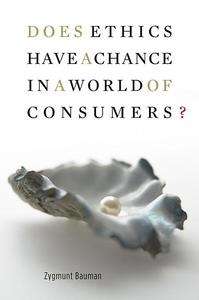Does Ethics have a Chance in a World of Consumers?

Editorial Harvard University Press
Fecha de edición mayo 2009
Idioma inglés
EAN 9780674033511
272 páginas
Libro
encuadernado en tapa blanda
Resumen del libro
Zygmunt Bauman is one of the most admired social thinkers of our time. Once a Marxist sociologist, he has surrendered the narrowness of both Marxism and sociology, and dares to write in language that ordinary people can understand about problems they feel ill equipped to solve. This book is no dry treatise but is instead what Bauman calls a report from a battlefield, part of the struggle to find new and adequate ways of thinking about the world in which we live. Rather than searching for solutions to what are perhaps the insoluble problems of the modern world, Bauman proposes that we reframe the way we think about these problems. In an era of routine travel, where most people circulate widely, the inherited beliefs that aid our thinking about the world have become an obstacle.
Bauman seeks to liberate us from the thinking that renders us hopeless in the face of our own domineering governments and threats from unknown forces abroad. He shows us we can give up belief in a hierarchical arrangement of states and powers. He challenges members of the knowledge class to overcome their estrangement from the rest of society. Gracefully, provocatively, Bauman urges us to think in new ways about a newly flexible, newly challenging modern world. As Bauman notes, quoting Vaclav Havel, hope is not a prognostication. It is, rather, alongside courage and will, a mundane, common weapon that is too seldom used.
Biografía del autor
Zygmunt Bauman nació en Poznan, Polonia, en 1925 y falleció en la ciudad inglesa de Leeds en 2017.<br> Tras la invasión nazi, su familia se refugió en la zona soviética y Bauman se alistó en el ejército polaco, que liberaría su país junto a las tropas soviéticas. Fue miembro del Partido Comunista hasta la represión antisemita de 1968; la consiguiente purga le obligó a abandonar su puesto como profesor de filosofía y sociología en la Universidad de Varsovia. Después enseñó sociología en Israel, Estados Unidos y Canadá, y fue profesor emérito en la Universidad de Leeds (Reino Unido).<br> En su abundante producción destacan libros fundamentales de la sociología contemporánea como Modernidad y holocausto o Modernidad líquida, o el volumen de conversaciones Vivir en tiempos turbulentos, donde nos brinda un acceso privilegiado a su pensamiento y a diversos aspectos clave de su vida. Zygmunt Bauman mereció el Premio Príncipe de Asturias de Comunicación y Humanidades 2010, el Premio Amalfi de Sociología y Ciencias Sociales (1992) y el Theodor W. Adorno (1998).








